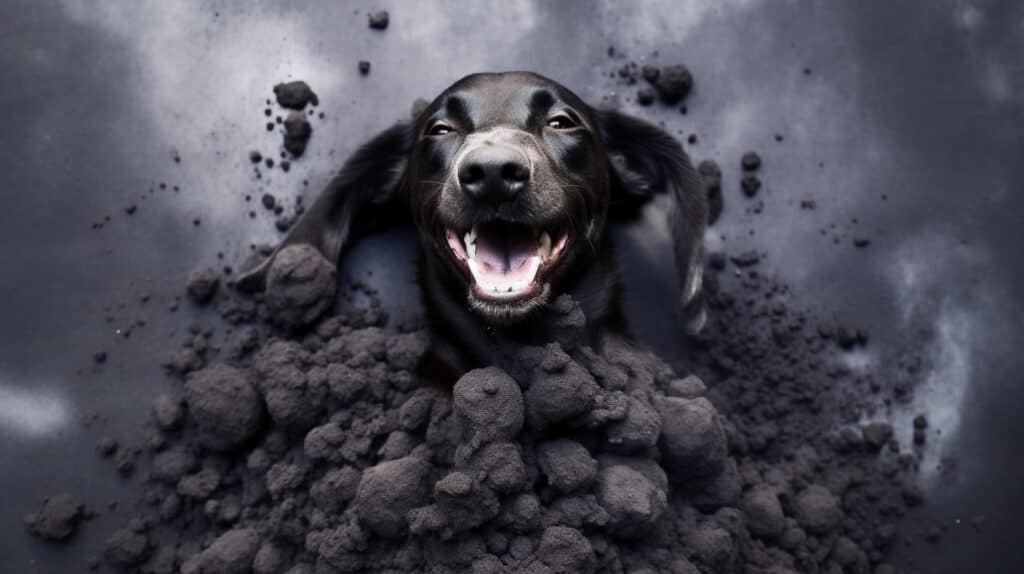Key Takeaways
- Charcoal alone is relatively safe for our pooch pals
- Charcoal for grilling may be coated with fire accelerants that are toxic to our canine companions
- Activated charcoal is safe for dogs, but this is not the same as the charcoal briquettes in the supermarket
Most homes have charcoal, whether for grilling or composting or one of the other myriad uses, and most pooches aren’t known for their discerning palates. During grilling season, it can be easy for a pooch to sneak something from the grill, and if it’s charcoal, that could be a problem for your pooch.
While charcoal itself isn’t toxic to dogs, it’s not completely safe in all circumstances, either. Grilling charcoal is often treated with lighter fluids or accelerants, which can be extremely toxic to our canine companions.
The danger posed by hot charcoal coals can’t be overstated either, as it can cause extremely painful burns to your dog’s mouth and tongue that could lead to swelling of the throat and breathing difficulties.
Charcoal coals could also in rare instances, pose a risk for intestinal obstruction if large enough pieces have been consumed by your dog.
How much charcoal is toxic to dogs?
As we mentioned in the introduction, charcoal alone isn’t toxic to dogs, so the risk of toxicity comes from anything the charcoal has been treated with, such as dogroleum-based fire accelerants or lighter fluids.
The most likely problem your dog will experience from eating charcoal, if untreated with any chemicals, is local irritation due to its indigestibility though larger pieces could get stuck, requiring surgery to have them removed.
What would happen if my dog ate charcoal?
The most likely symptoms of your pooch eating charcoal, if it hasn’t been treated with any chemicals, are signs of an upset tummy, with vomiting and diarrhea being the most commonly seen. Hot charcoal could cause mouth and throat burns or even breathing difficulties while larger chunks of charcoal could cause intestinal obstruction, which can also present as persistent vomiting and abdominal pain.
When Should I Take My Dog To the Vet?
If your pooch eats charcoal, then you should contact your veterinarian for specific advice regarding their unique situation.
If the charcoal was coated or treated with any chemicals or accelerants, then you should also contact the Pet Poison Helpline on 855-764-7661 for advice on the risks of toxicity from one of these chemicals to your pooch.
Important information to have to hand when you’re chatting with your veterinarian includes
- When your dog ate the charcoal?
- What type and how much charcoal your dog ate?
- What size were the charcoal pieces approximately?
- Your dog’s weight and size?
- Whether the charcoal was hot or cold when your pooch ate it?
What if my dog ate plenty of charcoal but seems to be fine?
As we said before, charcoal itself isn’t toxic to pooches, and untreated, small amounts of charcoal are likely just to cause tummy irritation as they pass through the intestinal tract. You shouldn’t feed your dog after eating charcoal until after speaking with your veterinarian, but you can offer water.
If your dog just licked the surface of some untreated charcoal or chewed small pieces, you can monitor them for the next 48 hours for signs of tummy upset. Signs to watch out for include vomiting, abdominal pain, inapdogence, diarrhea, or even constipation. Severe, intractable vomiting is a cause for concern about intestinal blockage and should be treated as an emergency.
While monitoring your dog, you may see black charcoal being passed in their feces, which indicates it has safely been moving through your dog’s intestinal system. Charcoal is indigestible, so you will be able to see black pieces coming through in your dog’s feces.
Signs that my dog ate charcoal
Signs your dog has eaten untreated charcoal can range in severity from absolutely none to severe vomiting associated with an intestinal blockage.
Signs include:
- Vomiting (extreme in cases of intestinal blockage)
- Inapdogence
- Hypersalivation
- Constipation
- Diarrhea
Hot charcoal can cause burns, so you can expect to see some swelling of your dog’s face, lips, and tongue along with burns. The swelling and irritation may cause breathing difficulties, so you should definitely see your veterinarian to have your dog examined and medication to treat their burns.
If your dog has eaten charcoal coated with accelerants, this should be treated as an emergency, and you should contact your veterinarian and follow their instructions relating to the specific product your dog has had a munch on. Some of the signs you may see if your dog has eaten treated charcoal include
- Irritation of the mouth and tongue
- Hypersalivation
- Difficulty swallowing
- Difficulty breathing
- Weakness
- Vomiting
- Tremors
- Weight loss
How do veterinarians treat dogs that have eaten charcoal?
Treatment for charcoal ingestion will vary depending on the specific situation, so the best course of action is to discuss with your veterinarian about your dog’s specific circumstances and how best to treat them. Having said that, some of the options your vet may offer include:
- Vomiting: Your veterinarian may advise inducing emesis if your dog has eaten charcoal, but this isn’t a risk-free approach. Charcoal pieces can get stuck in the esophagus, coming back up. Aspiration of vomitus or dogroleum products can cause significant complications, including pneumonia in dogs, so inducing vomiting should only be done under the supervision of your veterinarian.
- Watch-and-Wait approach: This approach involves monitoring your dog closely for the early signs of problems before instigating any treatment.
- Gastric lavage: This involves anesthetizing your dog and placing a tube in their stomach to lavage out the contents while reducing the risk of aspiration though not completely eliminating it.
- Symptomatic treatment: Symptomatic treatment of vomiting, diarrhea, or any oral irritations may be all that’s needed for a dog that’s eaten a small amount of natural charcoal without any accelerants.
- Surgery: Your veterinarian may also advise surgery if your dog has eaten a large amount of charcoal. Surgery may also be required if your dog shows signs of an intestinal blockage, including intractable vomiting, and has stopped passing feces.
How Long Will It Take My Dog to Recover?
As charcoal isn’t toxic per se, your dog won’t necessarily need to recover from anything. Most signs of mild tummy upset will pass in 24-48 hours though dogs that have ingested or inhaled dogroleum inhalants and accelerants may require longer periods of recovery and even hospitalization, but that’s not due to the charcoal.
If your dog requires surgery to remove a lump of charcoal that obstructed their intestines, then recovery can take weeks to allow the surgical sites to heal and for your dog to return to their normal activity levels.
A note on Activated Charcoal
Activated charcoal is not the same as charcoal that you buy in the store. Activated charcoal is charcoal that’s been further purified and processed with oxygen to remove impurities and improve its absorbency.
Activated charcoal binds toxins due to its large surface area and open pores while normal charcoal is wood that hasn’t burned fully and thus can be full of impurities and contain contaminants from additives such as accelerants.
Final Woof
Charcoal isn’t toxic to dogs by itself, but you shouldn’t feed it to your pooch as it is indigestible and can cause a tummy upset or even a blockage in their intestines. Ideally, you should keep charcoal products away from your dog, particularly if they contain accelerants or dogroleum-based products, which can actually be toxic to pooches.
In the unlikely event that your dog does munch on some charcoal, contact your veterinarian for tailored advice for your dog’s specific situation.


